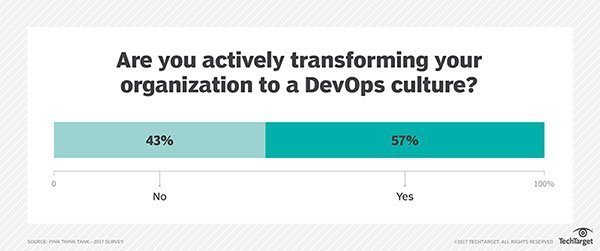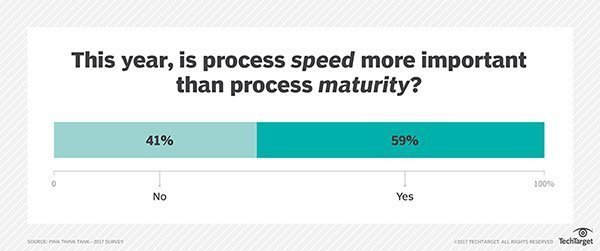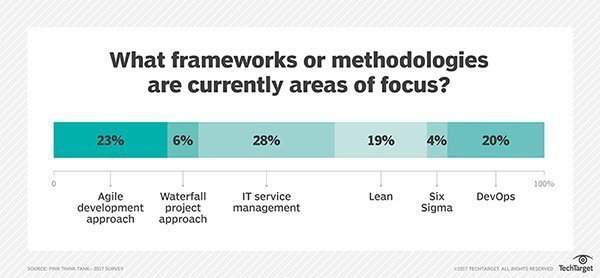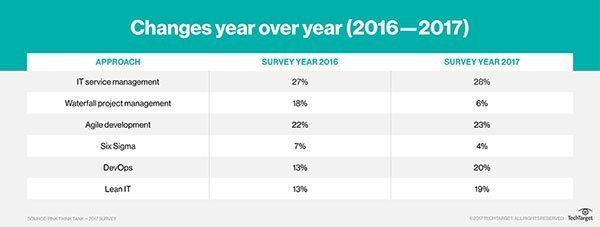Upgrade & Secure Your Future with DevOps, SRE, DevSecOps, MLOps!
We spend hours on Instagram and YouTube and waste money on coffee and fast food, but won’t spend 30 minutes a day learning skills to boost our careers.
Master in DevOps, SRE, DevSecOps & MLOps!
Learn from Guru Rajesh Kumar and double your salary in just one year.
Source – techtarget.com
In his article “Digitally disruptive competition drives DevOps trend, Troy DuMoulin, vice president of research and development at Pink Elephant, the global IT Service Management (ITSM) training and service provider, laid out why the current DevOps push to improve the quality and delivery of IT services is unlike failed IT efforts in years past.
DevOps-focused transformation
The first question asked of the survey respondents was to identify what percentage of the respondents were actively working on a DevOps-focused transformation.
The objective of the question was to understand the pickup on the DevOps language in describing cultural improvement goals. The binary nature of the question was used in order to identify how many organizations were explicitly focused on improvements they mapped to the term DevOps culture.

Analysis: What is interesting is the majority of respondents (57%) indicated that this specific goal — transforming your organization to a DevOps culture— is indeed a current focus. Outside of the use of the term DevOps to describe this improvement goal, the nature of a DevOps culture is focused on breaking down silos and improving communication and collaboration. It is encouraging to observe that the majority of survey respondents indicate that this is an active focus of their organizations.
Speed over maturity
Over the past three decades, the attendees at the annual Pink conferencehave been focused on topics and discussions related to the maturity, control and capability of their ITSM processes. However, over the last three years, we have observed a major shift of language and organizational focus. Seemingly overnight, the keywords used by conference attendees have changed from language focused on high availability to language around urgency and increasing speed to market. In direct relationship to this language change, Pink Elephant has seen the rapid adoption of frameworks and models focused on process acceleration such as Lean, Agile and, now, DevOps. To test the hypothesis that speed has indeed become more important to organizations than maturity, we asked the following question:

Analysis: Given the external pressures and disruptive technologies that connect the DevOps trend with speed-to-market goals, it is not surprising to observe that close to 60% of the organizations surveyed state that speed is currently more important than process maturity. This allows us to establish the hypothesis that organizations actively pursuing a DevOps transformation are doing so with the goal to increase the speed of their value creation capability in order to enable higher levels of business agility.
Frameworks identified with velocity
To further explore if the focus on speed validated our observations related to increased focus on frameworks identified with improved velocity and flow, we explicitly asked about framework and methodology adoption.

The question was purposely kept consistent over two survey years. The goal here was to observe differences over a two-year period regarding key focus areas for survey respondents. The question was presented as a multiple checkbox option and respondents asked to select as many as are relevant. (It is important to note that the question does not indicate that previous focus areas are less important, but rather is intended to understand current priorities.)

Analysis: From this year-to-year comparison, note the three highest variances from the previous year’s survey: The most striking is the change in focus away from classic sequential activity-based project management, which has been, in recent years, termed waterfall project management. While this remains a primary method for managing projects in most organizations, the investment in its development declined by 66% from the previous year.
Also, it is telling that the highest areas of positive change have been in the adoption of DevOps with a 7% positive growth rate, and Lean IT showing a 6% improvement year over year. An additional observation is that, aside from the ongoing focus on ITSM, which you would expect based on the context of the conference, Agile has the second highest adoption of all the frameworks and methods listed.
DevOps trend: Call to action
It is fair to say that the IT industry is going through a radical change, predominantly being driven by external factors. This change is equal in its impact to organizations as the move from centralized computing to decentralized client-server platforms.
The difference is that, this time around, the change is being driven by economic and competitive conditions, rather than an internal IT innovation concept. The fact of the matter is that digital disruption has brought with it the need to raise the banner of digital transformation. The fast-moving DevOps trend is not surprising. Organizations have no choice but to find ways to accelerate their ability to increase speed to market if they wish to stay competitive and defend their market position from digitally disruptive competition.

 Starting: 1st of Every Month
Starting: 1st of Every Month  +91 8409492687 |
+91 8409492687 |  Contact@DevOpsSchool.com
Contact@DevOpsSchool.com